商务英语之词类转译
- 格式:ppt
- 大小:815.00 KB
- 文档页数:7
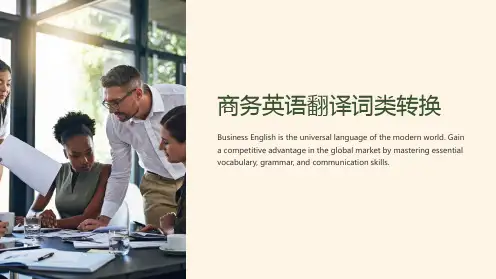

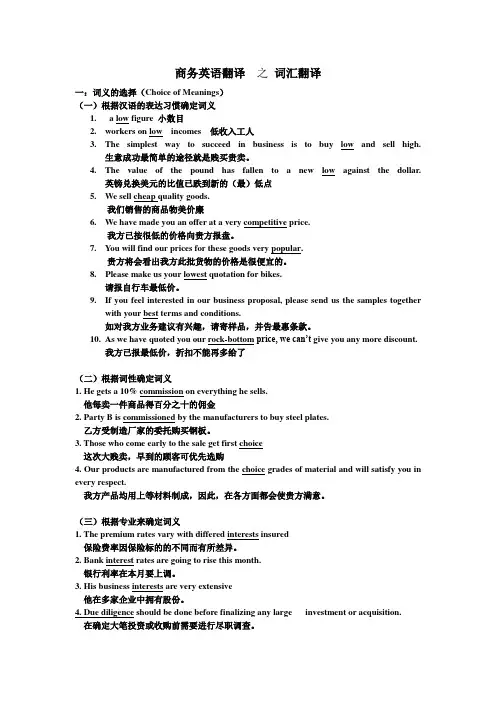
商务英语翻译之词汇翻译一:词义的选择(Choice of Meanings)(一)根据汉语的表达习惯确定词义1. a low figure 小数目2.workers on low incomes 低收入工人3.The simplest way to succeed in business is to buy low and sell high.生意成功最简单的途径就是贱买贵卖。
4.The value of the pound has fallen to a new low against the dollar.英镑兑换美元的比值已跌到新的(最)低点5.We sell cheap quality goods.我们销售的商品物美价廉6.We have made you an offer at a very competitive price.我方已按很低的价格向贵方报盘。
7.You will find our prices for these goods very popular.贵方将会看出我方此批货物的价格是很便宜的。
8. Please make us your lowest quotation for bikes.请报自行车最低价。
9.If you feel interested in our business proposal, please send us the samples togetherwith your best terms and conditions.如对我方业务建议有兴趣,请寄样品,并告最惠条款。
10.As we have quoted you our rock-bottom price, we can’t give you any more discount.我方已报最低价,折扣不能再多给了(二)根据词性确定词义1. He gets a 10% commission on everything he sells.他每卖一件商品得百分之十的佣金2. Party B is commissioned by the manufacturers to buy steel plates.乙方受制造厂家的委托购买钢板。
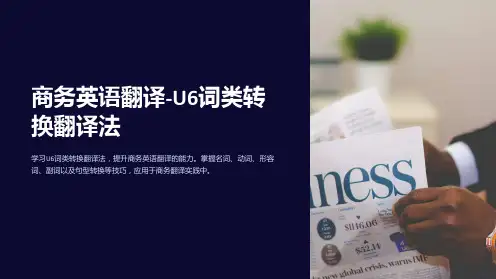

![[精品]商务英语翻译词类转换](https://uimg.taocdn.com/92d5d4505acfa1c7aa00ccce.webp)
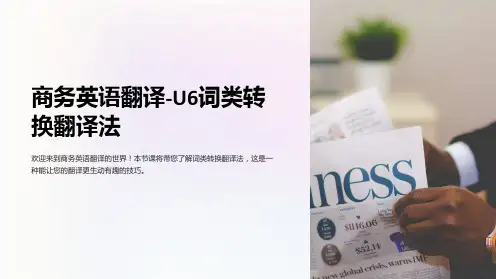
![商务英语翻译7.2词性转换、词的增减[精]](https://uimg.taocdn.com/cb04ab2a6bd97f192279e93a.webp)
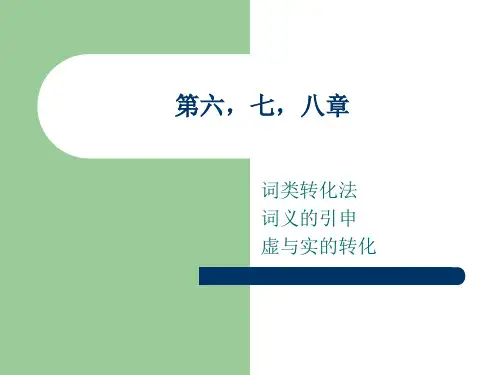
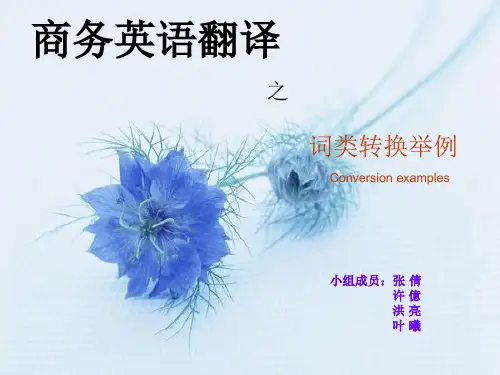
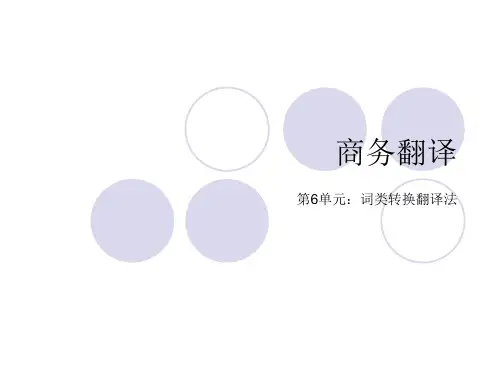
商务词类转译词类转换是翻译中常见的技巧。
就商务英语翻译而言,最常见的是名词、介词、形容词及动词间的互相转译。
一、名词与动词的互相转译研究表明:英语的名词在词汇中占有绝对优势,常用名词来表达汉语中用动词表达的概念(如抽象的行为名词) ,而且动词的兼类情况非常明显,加之英语有词形变化, 许多动词词尾加上后缀, 如-ment , - tion , - ance , - er , - or 等,即可变成名词。
相反,汉语却以动词占优势,而且一个句子不限于用一个动词,可以几个动词连用。
因此,英译汉时许多名词可译成汉语的动词;汉译英时动词也常译成名词(或介词+ 名词) 。
英语中具有抽象动作意义的名词汉译时常译成动词。
(1) The repeal of the Corn Laws by Great Britain in 1846 ended Britain′s long - standing policy protectionism.1846 年英国废除《谷物法》,结束了英国长期存在的贸易保护主义政策。
(2)And in a best - selling book ,Lester Thurow told us that America would soon be going head together with a Germanled Europe in the struggle for world markets.莱斯特·瑟罗在他的一本畅销书中断言,美国不久将要与德国领导的欧洲势均力敌地争夺国际市场。
原文中“struggle”为介词“in”的宾语,但汉语译文直接将它译成动词“争夺”,比原文来得更直接更传神。
(3) The first was the belief among many national leaders that the events leading to the Second World War were triggered by the Great Depression of the1930s,which in turn was believed to have been prolonged and deepened by the very high tariffs enacted by virtually all of the major trading nations during the early 1930s.有时在英译汉时,如将名词译成动词,则更易于处理。
商务英语中的翻译技巧一、一词多义同一个词,由于语境不同,其词义可千差万别。
试看下面几个例子:1.They cannot obtain credit at all in the trade.他们生意信誉已荡然无存。
二、词类转译词类转译是国际商务翻译中常见的译词技巧。
常见的有名词与动词、介词与动词的互相转译。
1.名词与动词的互相转译:Before the payment of these tariffs, the imported goods will bein the custody of the customs.交关税前,进口货物由海关保管。
( 由于语法限制,只有用名词形式,但译成汉语时,payment译作"交')三、词义引伸在商务英语翻译中,有时会碰到某些词在词典上难以找到贴切具体上下文词义,如生搬硬套,译文往往语意不清,甚至导致误解。
在这种状况下,必须要依据上下文和逻辑关系,从该词固有基本含义出发,进一步加以引伸。
例如:The arrivals do not conform to the sample.2商务英语的翻译特点1、广泛使用缩略词为了节省商务活动过程中书写、说话和阅读的时间,提升效率,在商务英语的使用过程中经常使用缩略词,如CCIB;另外,商务外贸业务也大量地运用缩略词,比如:L/C。
2、大量使用长句、复合句和被动句,句式规范完整注重细节商务英语句子成分的每一个部分都有可能运用各种修饰语,使其成为规范又结构复杂的长难句,所以商务英语中往往长难句比较多,但他的规范性又使商务英语在使用时具备准确性、逻辑性和效率性。
3、商务英语的句法特点由于商务英语的句子结构复杂,句子正式规范,尤其是在表达上,商务英语更加注重精准、准确,强调客观事实,所以句子一般使用从句和被动语态较多,特别是在合同或是文件中更是如此。
3商务英语的翻译特征(一)较强的专业性。
在对商务英语进行翻译时,翻译者应该针对相关的知识和某一专门的行业,并运用一定的翻译技巧和策略,来使译文符合原文内容。
商务英语翻译词类转译初探Transformation of Parts of Speech in the Translation of Business English摘要:英汉两种语言在语言结构和表达习惯上都有所不同,不能机械地把英语中的某一类词语译成汉语中的相同一类词.在英译汉过程中,有些句子可以逐词对译,有些句子则由于英汉两种语言的表达方式不同,就不能逐词对译,只能将词类进行转译之后,方可使译文显得通顺、自然.在汉译英过程中,由于汉语中的动词出现较多,除大量的动宾结构外,还有连动式兼语式等两个以上动词连用的现象,而英语则不然,所以常常需要把汉语的动词转换成英语名词。
关键词:词类商务英语转译Abstract: There are different between English and Chinese in language structure and expression of habits, which can not be mechanically in a certain category of English words translated into Chinese words in the same category. In the English-Chinese Translation process, some sentences can be translated word for word pairs, and some sentences are due to the expression of two languages, English in different ways, we can not word for word on the translation of parts of speech can only be translated after the translation appears to be so fluent and natural. In the course of Chinese-English translation , because the verb occur more frequently in Chinese, in addition to a large number of verb-object structure, there are also linked type and language type, and so the phenomenon of more than two verbs used in conjunction, while the English is not, therefore, the verb is often needed to convert into English nouns.Key word:parts of speech, business English, transformation.IntroductionBusiness English informs business information, such as theory and practicality...etc., its vocabulary profession is the strongest; the language norm is formal, simple, direct and clearly. Business English translating with "accuracy, intuitive, literary" three principles. Because the structure and custom of language are greatly different, we have to understand the characteristic of vocabulary and the language’s structure of Chinese and English, it’s the only way to carry on phrase to translate properly.English and Chinese are different in the linguistic structure and expression of habits, it can not be mechanically translated into Chinese words in the same category, such as the Chinese noun translated into English noun, the verb translated into Chinese verb, etc., it seems often make a Chinese translation does not fluent, and sometimes even seem lame in the English-Chinese translation, some sentences can be word for word to get right translation, and some sentences are due to the expression of two languages, English is in different ways, we can not translate word for word on the translation of part of speech ,it is the only way that could let translation appears to be fluent and natural.Thus, in English translation, it should be in accordance with the context of the expression of ideas and need to convert the nature of parts of speech.1.English to Chinese1.1 Verbs Transformed into NounsEnglish verbs and other terms are translated into Chinese nouns. In Business English, are often encountered in the original English, some verbs or some adjectives, according to Chinese language habits, they must be translated in the terms, only in this way to get fluent translation. For examples:1. The large cities absorb the wealth and fashion of the nation.大都市是一国的财富集中之地.2. Formality has always characterized their relationship.他们之间的关系有一个特点,就是以理相待.the verb "absorb", "characterized" are translated as "gathering place", "characterized by" more in line with the Chinese language habits, more easily acceptable to people.3. The film impressed me deeply.这部电影给我留下了深刻的印象.4. He routinely radioed another agent on the ground.他跟凌夷个地勤人员进行了例行的无线电联络.5. I have always wondered at the passion many people have of going abroad.我在想,为什么许多人对出国如此热衷?6. As he is a perfect stranger in the city, I hope you will give him the necessary help.他对这座城市完全陌生,所以我希望你能给他必要的帮助.7. The President had prepared meticulously for his journey.总统为这次出访作了十分周密的准备。
商务英语名词化汉译的词类转换技巧商务英语名词化汉译的词类转换技巧词类转译是商务英语英汉翻译中常见的译词技巧,并且是英汉互译翻译实践中的重要手段之一。
下面是店铺分享的商务英语名词化汉译的词类转换技巧,欢迎大家阅读!一、问题和分析(一)商务英语汉译中存在的问题商务英语翻译课程是高职高专英语专业外贸和商务方向的核心课程之一。
“当今世界经济日益全球化,社会需要的人才是既懂英语又通晓商务知识的复合型应用人才,而商务英语翻译作为沟通中外经济、文化等的手段,其重要性更是不言而喻”。
名词化在商务英语中大量运用,体现了商务英语的文体特点。
但是由于商务英语中的名词化汉译难度较大,造成商务英语中文译文生硬、难懂,很难体现原文的文体特征。
(二)问题分析在我国,各个领域的专家学者对翻译标准的探讨从来没有间断过。
近代严复的“信、达、雅”标准,现代鲁迅的“力求易解”、“保存原作的风姿”标准,茅盾的“艺术创造性翻译”标准及傅雷的“神似”、钱钟书的“化境”等标准,都对翻译界产生过强烈的影响。
在各种翻译的标准和原则中,严复提出的“信、达、雅”最为广为人知。
在商务英语翻译的过程中译者应该做到对译本的信、达,即忠实、准确和通顺。
由于商务英语文本往往比较正式,修辞等也有约定俗成的表达,因此“雅”不作为商务英语翻译原则和标准的必需要求,除了一些特殊文本,如广告英语外,其他的文本翻译能雅则雅。
商务英语翻译中可以运用泰特勒的“翻译三原则”:第一,译作应完全复写出原作的思想;第二,译作的风格和手法应和原作属同一性质;第三,译作应具备原作所具有的通顺作为指导标准。
商务英语专业性强、逻辑严密、表达要求简练。
由于具有格式化、规范性的语言特点要求,商务英语的翻译自然不能像文学作品如诗歌等的翻译一样优美。
忠实原则要求,译文在意义和风格方面要忠实于原文,把原文完整而准确地表达出来,不随意进行改动、歪曲和增减;而通顺原则则要求译文通顺易懂,流畅自然,符合汉语的表达习惯,没有逐词死译、硬译的现象。